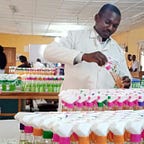RESTRATEGIZING APPROACHES IN THE FIGHT AGAINST COVID-19
The fight against the corona virus pandemic has been and still is a relentless one; enormous amount of resources have been put into the fight to curtail the spread of the virus and bring it to a total end. The demystification of the virus is a work in progress as scientists all over the world work tirelessly in finding out the mutant nature of the virus. Although a good number of reports have emerged since the first record of the outbreak in Wuhan, China providing details on the incubation period of the virus, the mode of transmission and symptoms of an infection, the treatment of the virus has however been systematically carried out considering the fact that a vaccine (and /or a cure) is yet to be developed.
Recent reports have revealed that Polymerase Chain Reaction-based COVID-19 tests, (RT-PCR), on the first day of infection, have a false negative rate of 100 percent in detecting SARS-CoV-2 (Coronavirus). A research carried out by a team of scientists from the Johns Hopkins School of Medicine, Baltimore, Maryland in the United States of America revealed that the Polymerase Chain Reaction based COVID -19 tests may have a false negative rate of 20 per cent or more depending on when it is done and when the sample is taken.
Also, a report in Medical News Today, a web based outlet for medical news, states that Polymerase Chain Reaction which involves taking minute samples from the nose or throat for genetic analysis is said to produce as many as one in five RT-PCR false negatives. The report further states that the test result incorrectly informs patients they have tested negative, when they have the virus. It is in this light that Salami .O Matthew, a Medical Laboratory Scientist, strongly advises the Nigerian government to create a better protocol in testing for COVID -19, highlighting the fact that the danger of a false report will only mean a continuous extension of community transmission of the virus, thereby crippling the effort of the Federal government in the fight against the pandemic.
Stressing the urgent need for a new strategy to be adopted in the testing protocol, Salami notes that research reports have shown that the probability of a false negative result seems to reduce to 67 per cent in 4 days after a person has been exposed to the virus; it decreases to 20 per cent after 8 days. However, the chance of a negative result increases to 66 per cent after a period of 21 days post exposure. Additionally, the research shows that the optimal time for testing for COVID-19 is 8 days following exposure. Hence, letting down the guard early by government and medical workers could be detrimental to the stability sustained so far. The lifting of restrictions by the Federal and state governments as well as the easing of medical procedures by medical workers after treating patients must be done with caution and after careful consideration of certain factors.
False negative results occur as a result of viral genetic material in people’s sample and the differences in sample collection albeit technique associated error cannot be ruled out as a possible cause. Therefore, if an individual tests negative to COVID-19 even after having symptoms consistent with the virus, the clinical and epidemiological situation should be put into consideration without ruling out a possibility of an infection. PCR-based methods and antibody testing could also be adopted in the care for patients who no longer have symptoms, but before using the testing kits, researchers within the cycle of the Medical Laboratory Science Council of Nigeria need to make sure they are reliable and easy to use.
Until a vaccine is discovered and developed, the possibility of Coronavirus becoming an endemic disease like HIV is the disturbing reality the world has to deal with. This support predictions made by certain international organizations on having Coronavirus becoming a part of a new normal way of life. The basic precautionary steps in preventing infection such as the washing of hands, social distancing and the wearing of face masks will probably become part of the human existence. Also, the evolving nature of the virus brings to limelight the need for medical scientists to never relent in the uncovering of the nature of the virus including its mutation, and the number of base pairs affected. Such information when effectively communicated to the public will go a long way in the fight against the virus.
